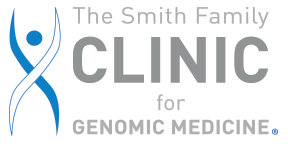Over 95% of people have a genetic change that affects how they respond to common medications, making some drugs more or less effective for each person. Some medications that are known to be impacted by genetics are statins, pain killers, blood pressure medications, antidepressants, blood thinners, chemotherapy drugs, and many more.
If you have a genetic change that affects how you absorb these medications, it could cause the drug to not work as well for you as it would for others, lead you to take a dose that is too high or too low, or even to cause unwanted side effects.
A specific type of genetic testing called pharmacogenomic testing can help you determine which medications will work the best for you, what dosage is best, and which drugs to avoid to lessen harmful side effects. This type of personalized medicine ensures that you and your physicians are making the best decisions for your unique needs, based on your own DNA.
For patients who are being treated for cardiac conditions such as a previous heart attack, high cholesterol, blood clots, or more, pharmacogenomic testing could help save your life.

The impact of pharmacogenomic testing on a heart attack survivor
Major General Lynn Collyar, USA, Ret., knows firsthand the difference that pharmacogenomic testing makes.
As a patient at the Smith Family Clinic for Genomic Medicine, a clinic specialized in genetic testing and genetic counseling located on the campus of HudsonAlpha Institute for Biotechnology, Lynn discovered information about his DNA that helped him and his cardiologist adapt his heart medication to him, decreasing his chances of having a life-threatening heart attack.
As a member of the U.S. Army, Lynn had always led an active lifestyle and prioritized his health. Though Lynn knew heart attacks run in his family, he did not expect he could have one himself. When he suffered from an unexpected heart attack, Lynn’s cardiologist placed him on statins and a platelet aggregation inhibitor to reduce his chances of having another cardiac event.
After seven years on his medication, Lynn discovered the Smith Family Clinic through connections in Leadership Huntsville. “When I first heard about HudsonAlpha and the Smith Family Clinic, I understood how important this resource was for our community in Huntsville,” said Lynn. “I learned the clinic offers testing to help you determine the best medication for you, and I thought this could be an interesting test that could affect my health and help my family long-term.”
Lynn did not have any specific expectations about what he might learn from pharmacogenomic testing, though he hoped it would positively impact his medical care. What he learned changed his life.
Life-saving knowledge
Pharmacogenomic testing revealed that Lynn had genetic variations that impacted how his prescriptions were absorbed by his body, causing them to be more or less effective, and in some cases, harmful to his health.
The statin Lynn was on was found to be at risk of not being effective for Lynn. He also noticed some side effects he believed to be related to the medication that caused him to frequently pull muscles or experience muscle pain, a known side effect statins can have on muscle cells. “As someone who enjoyed being active and working out, this was the hardest for me,” said Lynn.
Most importantly, the testing found that atorvastatin, a medication Lynn was prescribed to reduce platelet aggregation, was unlikely to have benefit for him. Because of a genetic change, Lynn is not able to appropriately metabolize the medication, making it ineffective at preventing the build-up of platelets in the blood, which can lead to heart attacks. “Even though I wasn’t experiencing adverse side effects of the medication, it wasn’t preventing another heart attack from happening,” said Lynn. “I was at risk of having another cardiac event because I wasn’t on the right medication.”
New prescriptions for a healthier life
“I learned that for seven years, I did not receive the benefits I should have from the medications I was taking,” said Lynn.
After getting his results, Lynn was able to present the data to his cardiologist to advocate for changing prescriptions. Although his cardiologist at the time wasn’t convinced about the validity of the testing results, the doctor consented to changing Lynn’s medications. Since then, his prescriptions have been more effective at preventing heart attacks while causing him fewer side effects.
“Pharmacogenomic testing empowered me as a patient to advocate for myself,” said Lynn. “Because of that, the quality of my care has improved, and so have my outcomes as a patient. There is tremendous value in this type of testing.”
If you’re interested in learning more about pharmacogenomic testing or scheduling a pharmacogenomic appointment at the Smith Family Clinic, contact the clinic at 256.327.9640.


